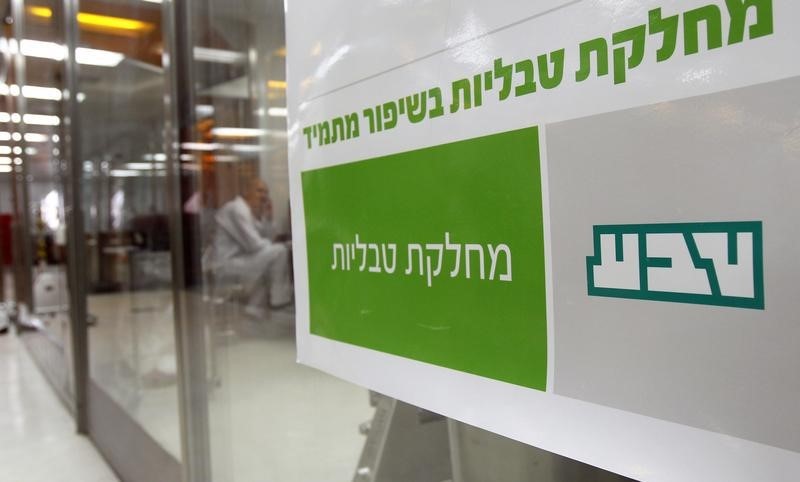By Tova Cohen and Steven Scheer
TEL AVIV (Reuters) - Israel's Teva Pharmaceutical Industries (ARCA:TEVA) will pay $40.5 billion in cash and stock for Allergan (NYSE:AGN_pa)'s generic drugs business, solidifying Teva's position as the world's No. 1 maker of generics while freeing Allergan to focus on branded drugs, paying down debt and potential "transformational" acquisitions.
The deal, the largest in Israel's corporate history, allows Teva stronger economies of scale, crucial in the low-margin generic drugs business. Teva, which dropped its hostile pursuit of Mylan (NASDAQ:MYL), will likely have to sell off some drugs to allay antitrust concerns.
"Allergan's business is more high-end (than Mylan). It's a more interesting business ... a profitable business and it's well managed," said Gilad Alper, an analyst at brokerage Excellence Nessuah.
Allergan, known for its Botox anti-wrinkle treatment, became the third-largest generic drugmaker in the United States after combining with Actavis (NYSE:AGN) in March. It is seen as a better fit than Mylan because it will improve Teva's distribution channels and access to profitable injectable drugs.
Pressure has been growing on Teva Chief Executive Erez Vigodman to find new revenue sources to combat generic competition for its branded multiple sclerosis drug Copaxone. Copaxone accounts for about half of Teva's profit.
Allergan CEO Brent Saunders, who led Actavis' purchase of Forest Laboratories and then Allergan, said the company will use the $36 billion in net proceeds from the generics sale to help fund further large acquisitions.
"We can accelerate our timing on transformational M&A," Saunders said during a conference call. He cited aesthetics, eye care, central nervous system disorders and gastrointestinal therapies as areas for potential future deals. Wall Street analysts speculated that possible targets include Biogen (NASDAQ:BIIB) Inc, Amgen Inc (NASDAQ:AMGN) and AbbVie Inc (NYSE:ABBV).
The healthcare sector has seen an unprecedented wave of deals since early 2014, from large drugmakers buying up smaller rivals, to consolidation among makers of generic medicines and tie-ups between insurers.
Global healthcare M&A reached $398.5 billion as of July 23, up 80 percent on a year ago, according to Thomson Reuters data.
HIGHLY COMPETITIVE
Teva shares, which had been weighed down by the Mylan uncertainty, rose 13 percent in New York trading on Monday. Allergan shares gained 7.2 percent and Mylan shares slid 14.4 percent.
Mylan had used a poison pill-style defense to fight a $40 billion takeover by Teva, arguing that a deal was "without sound industrial logic or cultural fit" and would face regulatory hurdles. The company said on Monday it would continue efforts to buy Perrigo, whose shares were up 3.8 percent.
Teva may need to sell a large number of assets to satisfy antitrust authorities about the Allergan transaction, according to two antitrust attorneys who handle pharmaceutical deals.
"But if you look at the total size of the deal, that's going to be a tiny fraction," one of the lawyers said.
It may also be harder to find buyers for those drugs given the consolidation already seen in the generics sector, they said. The U.S. Federal Trade Commission requires buyers for proposed divestitures before it will approve a deal.
Teva said it has identified asset sales needed for the deal to pass muster with U.S. and UK antitrust regulators, and that the number was less than what had been anticipated in a combination with Mylan.
CULTURAL FIT
Teva said it had approached Allergan a year ago but did not generate interest. It then went after Mylan, which repeatedly rebuffed its offers, and only turned its attention back to Allergan earlier this month. In June 2014, Vigodman hired Sigurdur Olafsson, former head of Actavis's generic drug business, to fill a similar role at Teva.
"My sense always was that Mylan was Teva's Plan B," said Benny Landa, an industrialist who led an investor bid last year to shake up Teva's board, calling the deal "brilliant".
Teva will pay $33.75 billion in cash and $6.75 billion in shares, representing a 10 percent stake in the Israel-based company, Teva said. It expects the deal to close in the first quarter of 2016.
Vigodman said the combined company will have proforma revenue of $26 billion and earnings before interest, tax, depreciation and amortization of $9.5 billion in 2016.
"This acquisition reinforces our strategy, accelerates growth and diversifies revenues both by product and geographically, supporting our new business model," he said.
Teva, which will gain a portfolio of more than 1,000 products, forecast a double-digit boost to adjusted earnings per share in 2016 and a more than 20 percent benefit in years two and three after closing the deal.
It expects cost synergies and tax savings of $1.4 billion annually by the third anniversary from efficiencies in operations, manufacturing, and sales and marketing.
It also expects the acquisition to generate free cash flow of $6.5 billion in 2016 and increased free cash flow in subsequent years. This means Teva will be able to pursue acquisitions to expand its portfolio in both specialty pharmaceuticals and generics.

J.P. Morgan is acting as financial advisor to Allergan and Latham & Watkins LLP is serving as Allergan's lead legal advisor. Barclays (LONDON:BARC) and Greenhill & Co are serving as financial advisors to Teva. Sullivan & Cromwell LLP and Tulchinsky Stern Marciano Cohen Levitski & Co are serving as legal counsel to Teva.